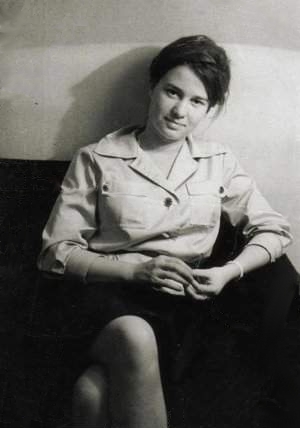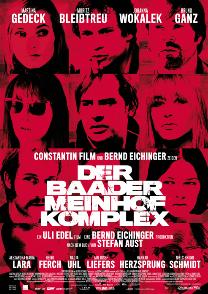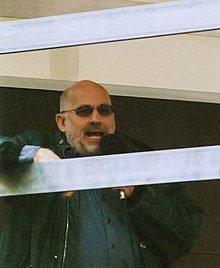
The Red Army Faction, also known as the Baader–Meinhof Group or Baader–Meinhof Gang, was a West German far-left militant group founded in 1970 and active until 1998. The RAF described itself as a communist and anti-imperialist urban guerrilla group. It was engaged in armed resistance against what it considered a fascist state. Members of the RAF generally used the Marxist–Leninist term "faction" when they wrote in English. Early leadership included Andreas Baader, Ulrike Meinhof, Gudrun Ensslin, and Horst Mahler. The West German government considered the RAF a terrorist organization.

Ulrike Marie Meinhof was a German left-wing journalist and founding member of the Red Army Faction (RAF) in West Germany, commonly referred to in the press as the "Baader-Meinhof gang". She is the reputed author of The Urban Guerilla Concept (1971). The manifesto acknowledges the RAF's "roots in the history of the student movement"; condemns "reformism" as "a brake on the anti-capitalist struggle"; and invokes Mao Zedong to define "armed struggle" as "the highest form of Marxism-Leninism".

Gudrun Ensslin was a German far-left terrorist and founder of the West German far-left militant group Red Army Faction.

The 2 June Movement was a West German anarchist militant group based in West Berlin. Active from January 1972 to 1980, the anarchist group was one of the few militant groups at the time in Germany. Although the 2 June Movement did not share the same ideology as the Red Army Faction, these organizations were allies. The 2 June Movement did not establish as much influence in Germany as their Marxist counterparts, and is best known for kidnapping West Berlin mayoral candidate Peter Lorenz.

Berndt Andreas Baader, was a West German communist and leader of the left-wing militant organization Red Army Faction (RAF) also commonly known as the Baader-Meinhof Group.

Ernst Christof Friedrich Zündel was a German neo-Nazi publisher and pamphleteer of Holocaust denial literature. He was jailed several times: in Canada for publishing literature "likely to incite hatred against an identifiable group", and on charges of being a threat to national security; in the United States, for overstaying his visa; and in Germany for charges of "inciting racial hatred". He lived in Canada from 1958 to 2000.
Brigitte Margret Ida Mohnhaupt is a German convicted former terrorist associated with the second generation of the Red Army Faction (RAF) members. She was also part of the Socialist Patients' Collective (SPK). From 1971 until 1982 she was active within the RAF.
Ingrid Schubert was a West German militant and founding member of the Red Army Faction (RAF). She participated in the freeing of Andreas Baader from prison in May 1970 as well as several bank robberies before her arrest in October 1970. She was found dead in her cell in 1977.
Monika Berberich is a convicted West German terrorist and a founding member of the Red Army Faction (RAF). She was involved in the violent freeing of Andreas Baader in 1970, and served a prison sentence between 1970 and 1988 in connection with it.

Frank Rennicke is a German songwriter and ballad singer from Braunschweig in Lower Saxony. He is one of the key figures within the far-right scene in Germany, and describes himself as a "national bard".
Christian Klar is a former leading member of the second generation Red Army Faction (RAF), active between the 1970s and 1980s. Imprisoned in 1982 in Bruchsal Prison, he was released on 19 December 2008, after serving over 26 years of his life sentence.

Manfred Roeder was a German lawyer and Neo-Nazi terrorist. Roeder was a Holocaust denier and an early representative of the Reichsbürger movement.

Jürgen Hans Paul Rieger was a Hamburg lawyer, avowed anti-semite, and deputy chairman of the National Democratic Party of Germany (NPD), known for his Holocaust denial. Rieger represented Arpad Wigand former SS Police Leader of the Warsaw district in Occupied Poland, in his trial for war crimes in Hamburg District Court. Wigand was subsequently found guilty in December 1981, and sentenced to 12.5 years.

The Baader Meinhof Complex is a 2008 German drama film directed by Uli Edel. Written and produced by Bernd Eichinger, it stars Moritz Bleibtreu, Martina Gedeck, and Johanna Wokalek. The film is based on the 1985 German best selling non-fiction book of the same name by Stefan Aust. It retells the story of the early years of the West German far-left terrorist organisation the Rote Armee Fraktion from 1967 to 1977.

Sylvia Stolz is a German Neo-Nazi, convicted Holocaust denier and former lawyer. Denial of the Holocaust is a criminal offense in Germany.
Siegfried Haag was a member of the West German Red Army Faction (RAF). He became a leading figure of the second generation of the group.

Günter Deckert was a German far-right political activist. He was the leader of the far-right National Democratic Party of Germany (NPD). He served five years in prison in Germany for various offences, including Holocaust denial and incitement to racial hatred. He translated the Leuchter report, an investigation he commissioned from an American Holocaust denier which attempted to cast doubt on the feasibility of mass extermination via the gas chambers in the Holocaust.
Ursula Hedwig Meta Haverbeck-Wetzel is a German neo-nazi activist from Vlotho. Since 2004, she has been the subject of multiple lawsuits and convictions for Holocaust denial, which is a criminal offense in Germany.
Irene Goergens is a former member of the West German terrorist group, the Red Army Faction (RAF).
The Frankfurt department store firebombings on 2 April 1968 in Frankfurt am Main were politically motivated arsons, in which the later co-founders of the left wing extremist Red Army Faction, Andreas Baader and Gudrun Ensslin were involved. Together with Thorwald Proll and Horst Söhnlein they set three fires, in two department stores at night and were sentenced to three years in prison each. No people were injured; the damage in the Kaufhaus M. Schneider was calculated at 282.339 DM and in the Kaufhof, 390.865 DM.













